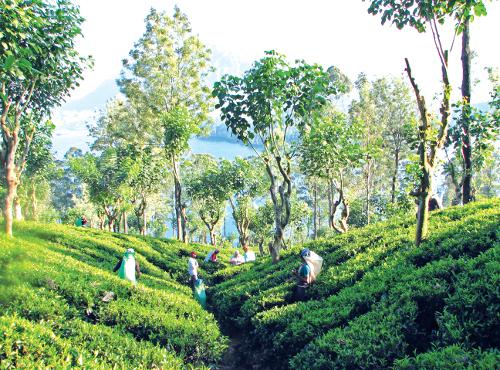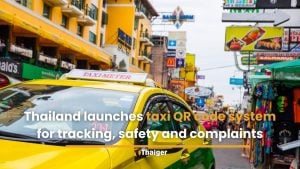Phuket Finance: Sri Lanka could be the next frontier for investors

PHUKET: When most Westerners think of Sri Lanka, the island nation off the coast of South India that was once known as Ceylon, they probably think of tea (as the country has long been a major tea exporter), science fiction author Arthur C Clarke (who spent most of his adult life living there) or the now defeated Tamil Tiger guerillas (who were notorious for suicide bombings) – seemingly not an up and coming frontier market for tourists and investors alike.
However, Sri Lanka has a recorded history dating back some 3,000 years, as its strategic location, along with deep harbors, has always made the island an important stop for travellers (like Marco Polo who wrote that it was the finest island in the whole world), explorers and traders for centuries. With Portuguese explorers arriving in the 1500s, followed by Dutch traders in the 1600s and ultimately the
British who took over the island from the Dutch during the Napoleonic Wars. The British stayed until after World War II, when independence led to simmering tensions, and ultimately, a very destructive civil war between the majority Buddhist Sinhalese and the Hindu/Christian Tamil minority.
No one knows for sure how many Sri Lankans died or were displaced during the 26-year civil war that lasted until 2009, but the conflict is estimated to have cost the country more than $200 billion or five times the country’s 2009 GDP. To add to the country’s miseries, the 2004 Indian Ocean tsunami killed some 35,000 people, displaced hundreds of thousands more and devastated the infrastructure in the areas it hit.
Today, Sri Lanka is once again open for business and is increasingly coming onto the radar of both foreign tourists and investors alike – something I observed on a recent two week holiday there. But is Sri Lanka set to become the next hot frontier market for all investors and how might retail investors take advantage of the growing number of investment opportunities there?
Why visit or invest in Sri Lanka?
My flight to Mattala International Airport in Southern Sri Lanka took about a three and a half hours and I arrived at the new international airport built to bring in more tourists like myself along with business travellers. In fact, I was told the new airport (just opened in early 2013 and one of three in the country) cost over $200 million (financed by the Chinese) and will be able to handle up to 6 million passengers per year once the second phase is completed, plus it’s located near a recently completed port (also financed and built by the Chinese) – meaning the airport is also part of an important cargo and logistics hub. Nevertheless, I did not see any foreigners at the new Southern airport (but then again, it’s not yet fully serviced by international airlines) and like most tourists who do venture to Sri Lanka, I headed straight to a beach area immediately for surfing. After I arrived at the beach, I still did not see many other foreigners and while locals told me they are seeing more foreign tourists since the end of the civil war, I never once saw a single McDonald’s, Pizza Hut or KFC in the South, albeit, I was told that some Western fast food chains now have locations in the big city of Colombo.
I should mention that the Sri Lankan economy has traditionally revolved around commodities like gems, tea, spices, rubber and coconuts, along with apparel making, rather than services like tourism, that’s starting to change because the end of the civil war has led to new hotels and other infrastructure (like the new airport I arrived at) to be built, upgraded or planned, so that modern day Marco Polos can rediscover the island. After all, there are plenty of reasons for foreign tourists to visit Sri Lanka when you consider that the island is small enough to be crisscrossed in a few days and has:
1. Eight world heritage sites, both natural and man-made.
2. Hundreds of other historical sites.
3. A number of scenic national parks with impressive biodiversity including everything from elephants to leopards and a vast variety of birds.
4. Plenty of festivals and religious places, as the country is home to Buddhists, Muslims, Hindus and Christians, all who revere Adam’s Peak as a sacred mountain.
5. Sporting activities including everything from land activities like golf to water activities like surfing and diving.
6. Beaches for year-round swimming or surfing depending upon which side of the island you are on.
More importantly, Sri Lankans are friendly, fairly well educated (a 94% literacy rate) and almost everyone you meet there can speak English. These qualities have helped the country to develop and grow a niche outsourcing industry (including publicly-traded Indian BPOs who have set up operations there) serving Fortune 500 companies globally. In fact, Sri Lanka has the highest number of UK-qualified accountants outside of the UK and this has attracted the attention of financial services firms who have set up their portfolio and analytics divisions there.
However, before Sri Lanka can truly live up to its branding as a “knowledge island”, the country still needs to work on improving basic infrastructure like roads and internet or telco bandwidth – especially outside of Colombo. With that said, Sri Lanka is apparently the only country in South Asia that can supply electricity to customers throughout the entire day without blackouts, plus it has the most liberalized economy in the region because foreign investors receive preferential tax rates, constitutional guarantees on investment agreements and exemptions from foreign exchange controls – plus 100% repatriation of profits and 100% foreign ownership is allowed in most areas of the economy.
Don Freeman is president of Freeman Capital Management, a Registered Investment Advisor with the US Securities Exchange Commission (SEC), based in Phuket, Thailand. He and provides personal financial planning and wealth management to expatriates. Specializing in UK and US pension transfers. Call 089-970-5795 or email: freemancapital@gmail.com
— Don Freeman
Latest Thailand News
Follow The Thaiger on Google News:























